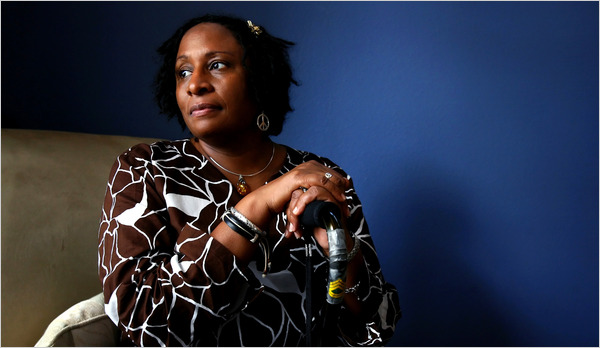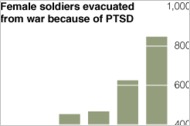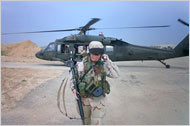ASPCA4EVER
Well-Known Member
Women at Arms
A Combat Role, and Anguish, Too

Chip Litherland for The New York Times
Vivienne Pacquette, who served in Iraq, is one of thousands of women who returned from war with a stress disorder.
By DAMIEN CAVE
Published: October 31, 2009
For Vivienne Pacquette, being a combat veteran with post-traumatic stress disorder means avoiding phone calls to her sons, dinner out with her husband and therapy sessions that make her talk about seeing the reds and whites of her friends’ insides after a mortar attack in 2004.
Multimedia
 Graphic Trauma From War
Graphic Trauma From War
 Slide Show Women in Their Own Words
Slide Show Women in Their Own Words
Related
Health Guide: Post-Traumatic Stress Disorder
Courtesy of Heather Paxton
Heather Paxton with a group of women and children in northern Iraq in 2003. More Photos »
As with other women in her position, hiding seems to make sense. Post-traumatic stress disorder distorts personalities: some veterans who have it fight in their sleep; others feel paranoid around children. And as women return to a society unfamiliar with their wartime roles, they often choose isolation over embarrassment.
Many spend months or years as virtual shut-ins, missing the camaraderie of Iraq or Afghanistan, while racked with guilt over who they have become.
“After all, I’m a soldier, I’m an NCO, I’m a problem solver,” said Mrs. Pacquette, 52, a retired noncommissioned officer who served two tours in Iraq and more than 20 years in the Army. “What’s it going to look like if I can’t get things straight in my head?”
Never before has this country seen so many women paralyzed by the psychological scars of combat. As of June 2008, 19,084 female veterans of Iraq or Afghanistan had received diagnoses of mental disorders from the [URL="http://topics.nytimes.com/top/reference/timestopics/organizations/v/veterans_affairs_department/index.html?inline=nyt-org"]Department of Veterans Affairs[/URL], including 8,454 women with a diagnosis of post-traumatic stress — and this number does not include troops still enlisted, or those who have never used the V.A. system.
Their mental anguish, from mortar attacks, the deaths of friends, or traumas that are harder to categorize, is a result of a historic shift. In Iraq and Afghanistan, the military has quietly sidestepped regulations that bar women from jobs in ground combat. With commanders needing resources in wars without front lines, women have found themselves fighting on dusty roads and darkened outposts in ways that were never imagined by their parents or publicly authorized by Congress. And they have distinguished themselves in the field.
Psychologically, it seems, they are emerging as equals. Officials with the Department of Defense said that initial studies of male and female veterans with similar time outside the relative security of bases in Iraq showed that mental health issues arose in roughly the same proportion for members of each sex, though research continues.
“Female soldiers are actually handling and dealing with the stress of combat as well as male soldiers are,” said Col. Carl Castro, director of the Military Operational Research Program at the Department of Defense. “When I look at the data, I see nothing to counter that point.”
And yet, experts and veterans say, the circumstances of military life and the way women are received when they return home have created differences in how they cope. A man, for instance, may come home and drink to oblivion with his war buddies while a woman — often after having been the only woman in her unit — is more likely to suffer alone.
Some psychiatrists say that women do better in therapy because they are more comfortable talking through their emotions, but it typically takes years for them to seek help. In interviews, female veterans with post-traumatic stress said they did not always feel their problems were justified, or would be treated as valid by a military system that defines combat as an all-male activity.
“Some of the issues come up because they’re not given the combat title even though they may be out on patrol standing next to the men,” said Patricia Resick, director of the Women’s Health Sciences Division at the National Center for P.T.S.D., a wing of the Department of Veterans Affairs.
While more men over all suffer from the disorder because they are a majority of those deployed, Dr. Resick added, “people underestimate what these women have been through.”
Indeed, at home, after completing important jobs in war, women with the disorder often smack up against old-fashioned ignorance: male veterans and friends who do not recognize them as “real soldiers”; husbands who have little patience with their avoidance of intimacy; and a society that expects them to be feminine nurturers, not the nurtured.
War as Equalizer
When Mrs. Pacquette joined the army in the ’80s — inspired by her father, who served in World War II — men often told her she did not belong. “Women were seen as weak and whiny,” she said. “Men had to go on sick call all the time but when a woman went on sick call, it was a big deal.”
Even before she was deployed to Iraq in 2004, however, she sensed what thousands of women have since discovered: that war would be an equalizer. And it was.
In early October 2004, her convoy of about 30 vehicles set out from Kuwait for Mosul, one of Iraq’s most violent cities. On the way, she said, they were hit three times with roadside bombs. One exploded 200 feet from the unarmored Humvee in which Mrs. Pacquette spent day and night pointing her rifle out an open window.
<<for more on this article>>
http://www.nytimes.com/2009/11/01/us/01trauma.html?_r=1&th&emc=th
********************************
The price of this hostile engagement will be felt for years after it's all said & done...and to what END?
Did we achive what we went in there after?
A Combat Role, and Anguish, Too

Chip Litherland for The New York Times
Vivienne Pacquette, who served in Iraq, is one of thousands of women who returned from war with a stress disorder.
By DAMIEN CAVE
Published: October 31, 2009
For Vivienne Pacquette, being a combat veteran with post-traumatic stress disorder means avoiding phone calls to her sons, dinner out with her husband and therapy sessions that make her talk about seeing the reds and whites of her friends’ insides after a mortar attack in 2004.
Multimedia
 Graphic Trauma From War
Graphic Trauma From War Slide Show Women in Their Own Words
Slide Show Women in Their Own Words Related
Health Guide: Post-Traumatic Stress Disorder
Courtesy of Heather Paxton
Heather Paxton with a group of women and children in northern Iraq in 2003. More Photos »
As with other women in her position, hiding seems to make sense. Post-traumatic stress disorder distorts personalities: some veterans who have it fight in their sleep; others feel paranoid around children. And as women return to a society unfamiliar with their wartime roles, they often choose isolation over embarrassment.
Many spend months or years as virtual shut-ins, missing the camaraderie of Iraq or Afghanistan, while racked with guilt over who they have become.
“After all, I’m a soldier, I’m an NCO, I’m a problem solver,” said Mrs. Pacquette, 52, a retired noncommissioned officer who served two tours in Iraq and more than 20 years in the Army. “What’s it going to look like if I can’t get things straight in my head?”
Never before has this country seen so many women paralyzed by the psychological scars of combat. As of June 2008, 19,084 female veterans of Iraq or Afghanistan had received diagnoses of mental disorders from the [URL="http://topics.nytimes.com/top/reference/timestopics/organizations/v/veterans_affairs_department/index.html?inline=nyt-org"]Department of Veterans Affairs[/URL], including 8,454 women with a diagnosis of post-traumatic stress — and this number does not include troops still enlisted, or those who have never used the V.A. system.
Their mental anguish, from mortar attacks, the deaths of friends, or traumas that are harder to categorize, is a result of a historic shift. In Iraq and Afghanistan, the military has quietly sidestepped regulations that bar women from jobs in ground combat. With commanders needing resources in wars without front lines, women have found themselves fighting on dusty roads and darkened outposts in ways that were never imagined by their parents or publicly authorized by Congress. And they have distinguished themselves in the field.
Psychologically, it seems, they are emerging as equals. Officials with the Department of Defense said that initial studies of male and female veterans with similar time outside the relative security of bases in Iraq showed that mental health issues arose in roughly the same proportion for members of each sex, though research continues.
“Female soldiers are actually handling and dealing with the stress of combat as well as male soldiers are,” said Col. Carl Castro, director of the Military Operational Research Program at the Department of Defense. “When I look at the data, I see nothing to counter that point.”
And yet, experts and veterans say, the circumstances of military life and the way women are received when they return home have created differences in how they cope. A man, for instance, may come home and drink to oblivion with his war buddies while a woman — often after having been the only woman in her unit — is more likely to suffer alone.
Some psychiatrists say that women do better in therapy because they are more comfortable talking through their emotions, but it typically takes years for them to seek help. In interviews, female veterans with post-traumatic stress said they did not always feel their problems were justified, or would be treated as valid by a military system that defines combat as an all-male activity.
“Some of the issues come up because they’re not given the combat title even though they may be out on patrol standing next to the men,” said Patricia Resick, director of the Women’s Health Sciences Division at the National Center for P.T.S.D., a wing of the Department of Veterans Affairs.
While more men over all suffer from the disorder because they are a majority of those deployed, Dr. Resick added, “people underestimate what these women have been through.”
Indeed, at home, after completing important jobs in war, women with the disorder often smack up against old-fashioned ignorance: male veterans and friends who do not recognize them as “real soldiers”; husbands who have little patience with their avoidance of intimacy; and a society that expects them to be feminine nurturers, not the nurtured.
War as Equalizer
When Mrs. Pacquette joined the army in the ’80s — inspired by her father, who served in World War II — men often told her she did not belong. “Women were seen as weak and whiny,” she said. “Men had to go on sick call all the time but when a woman went on sick call, it was a big deal.”
Even before she was deployed to Iraq in 2004, however, she sensed what thousands of women have since discovered: that war would be an equalizer. And it was.
In early October 2004, her convoy of about 30 vehicles set out from Kuwait for Mosul, one of Iraq’s most violent cities. On the way, she said, they were hit three times with roadside bombs. One exploded 200 feet from the unarmored Humvee in which Mrs. Pacquette spent day and night pointing her rifle out an open window.
<<for more on this article>>
http://www.nytimes.com/2009/11/01/us/01trauma.html?_r=1&th&emc=th
********************************
The price of this hostile engagement will be felt for years after it's all said & done...and to what END?
Did we achive what we went in there after?
